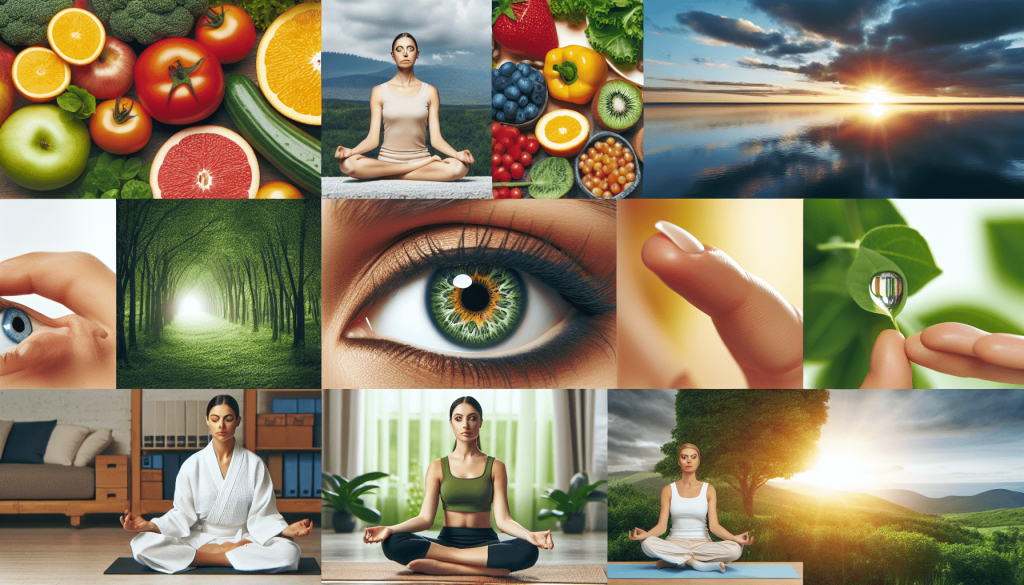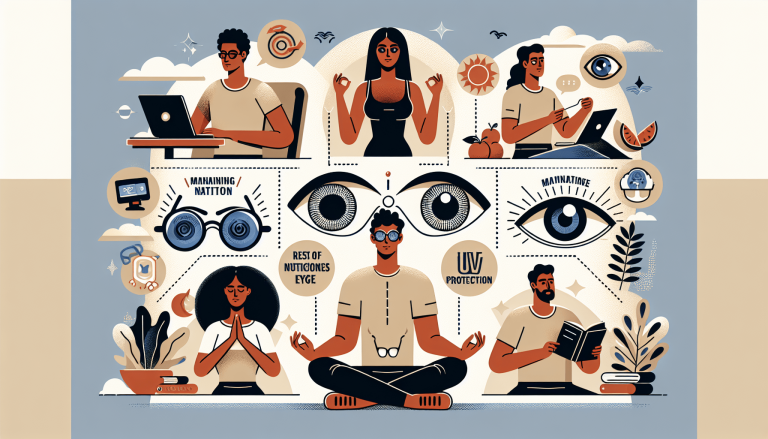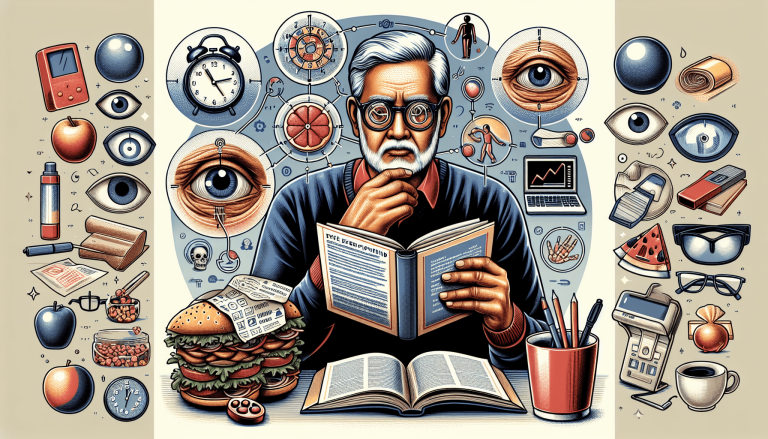Can You Improve Your Eyesight Naturally?
Imagine a world where you no longer need to rely on glasses or contact lenses to see clearly. It sounds almost too good to be true, doesn’t it? Well, what if I told you that there may be a way to improve your eyesight naturally, without resorting to costly surgeries or invasive procedures? In this article, we will explore whether it is possible to enhance your vision through natural methods, and the steps you can take to potentially achieve this goal. So, if you’ve ever wondered if there’s a way to regain your visual acuity without the aid of corrective lenses, keep reading to find out more.

Understanding Eye Health
Your eyes are an incredible part of your body, allowing you to perceive the world around you. Taking care of your eye health is of utmost importance to ensure clear vision and overall well-being. In this article, we will explore the importance of eye health, common eye problems, and the factors that can affect your eyesight.
The Importance of Eye Health
Having good eye health is essential for your daily activities and overall quality of life. Your eyes enable you to see and experience the beauty of the world. Additionally, maintaining good eye health can also help prevent various eye conditions and diseases that may significantly impact your vision.
Common Eye Problems
Many people experience common eye problems that can affect their vision. These may include conditions such as myopia (nearsightedness), hyperopia (farsightedness), astigmatism, and presbyopia (age-related difficulty focusing close-up). It’s important to be aware of these issues and understand their impact on your eyesight in order to take appropriate steps towards improving it.
Factors Affecting Eyesight
Various factors can affect your eyesight, including genetics, age, and lifestyle choices. Genetics play a significant role in determining your predisposition to certain eye conditions, such as myopia or glaucoma. Age-related changes, such as presbyopia, can also affect your vision. Additionally, certain lifestyle choices like excessive screen time, poor nutrition, and exposure to UV rays can contribute to eye problems.
Natural Ways to Improve Eyesight
While there is no guaranteed way to improve eyesight naturally, developing healthy habits can greatly contribute to maintaining good eye health. Let’s explore some natural ways to improve eyesight.
Eating a Balanced Diet
Eating a balanced diet rich in nutrients is essential for good eye health. Include foods that are high in antioxidants, vitamins A, C, and E, and minerals like zinc and selenium. Leafy green vegetables, citrus fruits, fish rich in omega-3 fatty acids, carrots, and eggs are all good choices for promoting better eyesight.
Eye Exercises
Regular eye exercises can help improve the strength and flexibility of your eye muscles. These exercises include techniques like eye palming, focus shifting, figure of eight, near and far focus, and blinking exercises. Incorporating these exercises into your daily routine can lead to better eye health and enhanced vision.
Taking Breaks from Screens
In today’s digital age, many of us spend long hours staring at screens, which can strain our eyes. Taking regular breaks and following the 20-20-20 rule can help alleviate eye strain. Every 20 minutes, look at an object 20 feet away for 20 seconds. This practice allows your eyes to rest and refocus, reducing the strain caused by prolonged screen time.
Protecting Your Eyes from UV Rays
Exposure to ultraviolet (UV) rays can damage your eyes and increase the risk of eye conditions such as cataracts and macular degeneration. To protect your eyes from harmful UV rays, wear sunglasses that block both UVA and UVB rays. Additionally, using wide-brimmed hats can provide additional shade and protection. It is also advisable to avoid peak sun hours when the sun’s rays are the strongest.
Proper Lighting Conditions
Proper lighting conditions play a crucial role in maintaining good eye health. Poor lighting can lead to eye strain, headaches, and difficulty focusing. It is important to have sufficient, evenly distributed lighting in your environment. Avoid harsh glares and adjust the brightness and contrast settings on your electronic devices for optimal viewing comfort.
Reducing Eye Strain
Eye strain can occur due to various factors, including prolonged screen time, reading in poor lighting conditions, and maintaining an improper posture. To reduce eye strain, take regular breaks from activities that require intense visual focus. Additionally, ensure you maintain proper posture and adjust the brightness and contrast settings on your screens to minimize eye fatigue.
Foods for Better Eyesight
Certain foods contain nutrients that are beneficial for eye health and can contribute to better vision. Let’s explore some of the best foods for better eyesight.
Leafy Green Vegetables
Leafy green vegetables such as spinach and kale are rich in antioxidants, particularly lutein and zeaxanthin. These nutrients can help protect your eyes from harmful blue light and reduce the risk of developing age-related macular degeneration and cataracts.
Citrus Fruits
Citrus fruits like oranges and grapefruits are excellent sources of vitamin C, which is essential for maintaining the health of blood vessels in the eyes. Vitamin C also reduces the risk of developing cataracts and slows the progression of age-related macular degeneration.
Fish and Omega-3 Fatty Acids
Fish, especially fatty fish like salmon, mackerel, and tuna, are high in omega-3 fatty acids. These fatty acids have been shown to reduce the risk of developing dry eyes and macular degeneration. Including fish in your diet can promote healthy eye function.
Carrots and Beta-Carotene
Carrots contain beta-carotene, which is converted into vitamin A in the body. Vitamin A is essential for good vision and maintaining a healthy cornea. Consuming carrots and other foods rich in beta-carotene can contribute to better eyesight.
Eggs and Antioxidants
Eggs are a great source of antioxidants such as lutein and zeaxanthin, which contribute to eye health. These antioxidants help protect the eyes from harmful blue light and reduce the risk of developing cataracts and macular degeneration.
Eye Exercises
Incorporating regular eye exercises into your routine can help strengthen your eye muscles and improve your vision. Let’s take a look at some effective eye exercises.
Eye Palming
Eye palming is a relaxation technique that helps relieve eye strain. Rub your palms together to generate heat, and then place them gently over your closed eyes. Enjoy the warmth and darkness, and let your eyes relax for a few minutes.
Focus Shifting
Focus shifting involves focusing on objects at different distances to improve the flexibility of your eye muscles. Start by focusing on an object close to you, then shift your focus to something farther away. Repeat this exercise several times to enhance your near and far vision.
Figure of Eight
Draw an imaginary figure eight horizontally in front of you, about 10 feet away. Follow the outlines of the figure eight with your eyes, moving smoothly and without straining. This exercise helps improve eye coordination and flexibility.
Near and Far Focus
Find an object near you and focus on it for a few seconds. Then, shift your focus to a distant object. Repeat this exercise multiple times to improve your ability to focus quickly and smoothly between near and far objects.
Blinking Exercise
Blinking is a natural way to moisturize and refresh your eyes. Staring at screens or focusing for extended periods of time can cause dryness and eye strain. Take breaks to intentionally blink your eyes rapidly for a few seconds, helping to lubricate your eyes and reduce dryness.
Screen Time and Eye Health
Spending a significant amount of time in front of screens, whether for work or leisure, can have an impact on your eye health. Let’s delve into the effects of screen time and explore tips for reducing eye strain.
The Impact of Screen Time on Eyesight
Extended screen time can lead to a range of eye problems, including digital eye strain or computer vision syndrome. Symptoms may include dry eyes, blurred vision, headaches, and neck or shoulder pain. The blue light emitted by screens can also disrupt your sleep-wake cycle and potentially affect your overall well-being.
Tips for Reducing Eye Strain from Screens
To reduce eye strain caused by screen time, follow some simple tips. Ensure your screen is positioned slightly below eye level and at a comfortable distance, usually about 20-28 inches away from your face. Adjust the brightness and contrast settings to suit your environment, and make use of anti-glare filters or screen protectors.
The 20-20-20 Rule
Following the 20-20-20 rule is an effective way to reduce eye strain. Every 20 minutes, take a break from your screen and focus on an object 20 feet away for at least 20 seconds. This allows your eyes to relax and readjust, relieving strain caused by continuous screen use.
Protecting Your Eyes from UV Rays
Ultraviolet (UV) rays from the sun can be harmful to your eyes and may contribute to eye conditions such as cataracts and macular degeneration. Let’s explore some ways to protect your eyes from UV rays.

The Dangers of UV Rays to Eye Health
UV radiation can damage the delicate tissues of your eyes and increase the risk of developing eye conditions. Prolonged exposure to UV rays without proper protection can lead to the development of cataracts, pterygium, and even skin cancer on the eyelids. It is important to take steps to shield your eyes from harmful UV rays.
Wearing Sunglasses
Investing in a good pair of sunglasses that block both UVA and UVB rays is essential for protecting your eyes from UV radiation. Look for sunglasses that offer 100% UV protection and have a wraparound design to shield your eyes from sunlight entering from the sides.
Using Wide-Brimmed Hats
In addition to wearing sunglasses, using wide-brimmed hats can provide further protection from the sun. The brim of the hat shades your face and eyes, adding an extra layer of defense against harmful UV rays.
Avoiding Peak Sun Hours
When the sun is at its peak, typically between 10 am to 4 pm, the UV radiation is strongest. Minimize your exposure to sunlight during these hours by seeking shade or staying indoors, especially on bright and sunny days.
Importance of Proper Lighting
Proper lighting conditions are essential for maintaining good eye health and preventing eye strain. Let’s explore the importance of proper lighting and how it can contribute to better eyesight.
Effects of Poor Lighting on Eyes
Insufficient or excessive lighting can impact your eyes and vision. Working or reading in dimly lit environments can strain your eyes and lead to headaches, eye fatigue, and decreased productivity. On the other hand, harsh and glaring light can cause discomfort and make it difficult to focus.
Choosing the Right Lighting
When it comes to lighting, aim for a balanced and evenly distributed light source. Natural light is preferable, so position your workspace near a window to maximize exposure to daylight. If natural light is limited, opt for warm white bulbs that have a color temperature similar to that of sunlight.
Avoiding Glare and Harsh Light
Glare from bright lights or reflections on screens can cause eye strain and discomfort. To avoid glare, position your light sources away from your direct line of sight and use anti-glare filters on screens. Adjusting your screen brightness and contrast settings can also help minimize the effects of harsh light.
Adjusting Screen Settings
Adjusting the settings on your electronic devices can significantly reduce eye strain. Ensure that your screen brightness is set to a comfortable level, not too bright or too dim. Adjusting the contrast and font size can make reading easier on the eyes, reducing the strain caused by prolonged screen use.
Reducing Eye Strain
Eye strain is a common issue experienced by many, particularly those who spend long hours on screens or engage in visually demanding activities. Here are some tips to help reduce eye strain and promote better eye health.
Taking Regular Breaks
Taking regular breaks from activities that require intense visual focus can help prevent eye strain. Every 20 minutes, look away from your screen or book and focus on a distant object to give your eyes a chance to relax and refocus.
Avoiding Eye Fatigue
Eye fatigue can occur when your eyes are overworked or become dry. To combat this, remember to intentionally blink more frequently when engaged in visually demanding tasks. You can also use lubricating eye drops to keep your eyes moist and refreshed.
Maintaining Proper Posture
Posture plays a crucial role in reducing eye strain. Sit up straight and ensure your screen is at eye level, with your chair and desk positioned ergonomically. Maintaining good posture will help prevent neck and back strain, which can indirectly affect your eye health.
Adjusting Screen Brightness and Contrast
Adjusting the brightness and contrast settings on your electronic devices can significantly reduce eye strain. Dimming your screen to a comfortable level, especially in dim lighting conditions, can help avoid excessive eye fatigue. Experiment with different settings to find what works best for you.
When to Seek Professional Help
While natural methods can contribute to better eye health, it is important to recognize when you should seek professional help. Regular eye exams are essential for detecting potential eye conditions and correcting vision problems. Additionally, if you experience persistent eye pain, sudden vision changes, or any other concerning symptoms, consult an optometrist or eye care professional for a proper diagnosis and appropriate treatment.
Signs That Require Medical Attention
Certain signs and symptoms indicate the need for immediate medical attention. If you experience sudden and severe eye pain, double vision, loss of vision, or any eye injury, seek emergency care. Additionally, if you notice changes in your vision, such as blurriness, difficulty focusing, or seeing halos around lights, it is important to schedule an appointment with an eye care professional.
Regular Eye Exams
Regular eye exams are crucial for maintaining good eye health. Even if you have perfect vision, it is recommended to have a comprehensive eye exam at least every two years. Eye exams can detect early signs of eye diseases, check the overall health of your eyes, and ensure the accuracy of your prescription if you wear glasses or contact lenses. Regular eye exams are especially important as you age, as the risk of developing certain eye conditions increases.
Consulting an Optometrist
If you have concerns or questions about your eye health, it is best to consult an optometrist. Optometrists are eye care professionals who specialize in vision and eye health. They can assess your vision, prescribe corrective lenses, diagnose and treat various eye conditions, and provide guidance on maintaining good eye health. Consulting an optometrist is an essential step towards ensuring the best care for your eyes.
Conclusion
Improving your eyesight naturally is possible by incorporating healthy habits into your lifestyle. By following a balanced diet rich in eye-friendly nutrients, practicing regular eye exercises, taking breaks from screens, protecting your eyes from UV rays, ensuring proper lighting conditions, and reducing eye strain, you can promote better eye health. However, it is important to remember that individual results may vary, and professional eye care should not be neglected. By prioritizing your eye health and incorporating these habits, you can set yourself on a path towards better vision and overall well-being.
Additional Resources

Did you know you can achieve 20/20 vision almost instantly in a completely natural way? Without surgery and without doing anything more “strenuous” than blinking your eyes…
And you can do it:
- No matter if you’re wearing glasses or lenses
- If you just have trouble reading road signs
- Or even if you’ve struggled with vision all your life
Find out how by watching a short video: https://bit.ly/macular-degeneration-treatment







